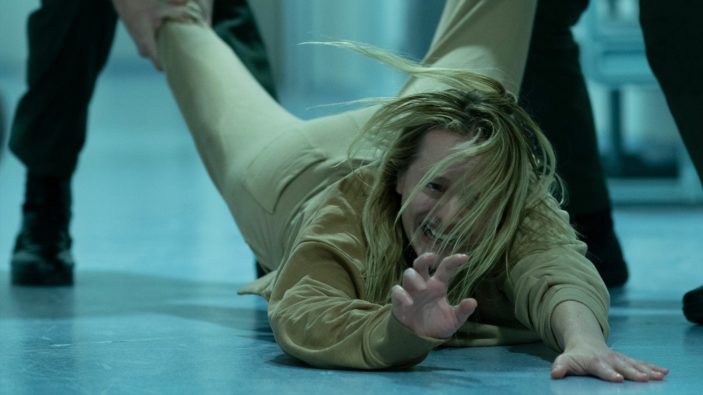
Had the Tom Cruise-led revamp of The Mummy not crashed and burned at the box office upon its release in 2017 then we’d be seeing, or more correctly not seeing, a very different Invisible Man. In an optimistic strategy from Universal Pictures – in their bid to compete with fellow juggernauts Marvel and DC – Cruise’s Mummy was to be the start of an interconnected franchise that would focus on bringing together the classic movie monsters of cinema-gone-by in a sector dubbed The Dark Universe.
The Mummy was to be the jumping point, and a Johnny Depp-driven Invisible Man was to follow (Javier Bardem was even cast in an intended Frankenstein offering) but it crumbled under its own disappointment before it had a chance to begin, so The Invisible Man we are being treated to now – and I can definitely tell you it’s a treat! – is its own entity, untarnished by expectation to be something bigger than it is. The titular character has been redesigned as the villain, and Elisabeth Moss‘s damsel in distress is eerily topical fodder for a film released in a post #MeToo era.
A revamped view of H.G. Wells‘ classic novel under the genre-perfected eye (and pen) of Australia’s Leigh Whannell (Saw, Insidious), the original’s brilliant optic scientist has been reimagined as Adrian Griffin (Oliver Jackson-Cohen), an equally brilliant but far more abusive scientist whose long-suffering girlfriend, Cecilia (Moss), has finally summoned the courage to leave their volatile relationship; her supportive sister (Harriet Dyer) picking her up from Adrian’s sprawling estate in the middle of the night.
Fearing for her safety and unable to make it to as far as the end of the driveway of her temporary residence – she has shacked up with childhood friend, now police officer James (Aldis Hodge) – Cecilia’s existence still feels just as controlled as it did under Adrian’s watchful eye. It’s only when she’s informed by Adrian’s brother, Tom (Michael Dorman), that he has supposedly killed himself that she starts to indulge in her freedom; it also helps that Adrian has left her a startling $5 million sum, a figure she’s at liberty to spend as she pleases should she not be arrested or deemed mentally incompetent.
Given the fact that her mental well-being is specifically mentioned, it stands to reason that her sanity will come into question throughout Whannell’s masterfully tense film, and when a series of events take place that drive Cecilia to the point of insanity, the validity of Adrian’s supposed death comes into play. Cecilia knows the unexplained events happening to her are real, but the torment she’s experiencing can’t be readily explained, so deeming her mentally unstable appears the most logical reason to those around her; framing Adrian as a gaslighting, abusive monster lends the film a sense of timely realism, even though the exaggerated situations very much adhere to the thriller/horror genre.
From the moment The Invisible Man starts, Whannell is in control of the film’s temperament. A near-wordless opening sequence detailing Cecilia’s escape from Adrian’s house is almost unbearably tense – a simple moment involving a dog bowl acts as the film’s first legitimate jump scare – and it’s here that Whannell showcases how ordinary surroundings have the potential to be chillingly frightening. In fact, much of The Invisible Man‘s first half is devoted to the gradual torment of Cecilia, and in refraining from using any loud noises or unnecessary jump-cuts, we as an audience are forced to endure her torment too as scenes of her slowly examining the corners of her home result in sequences of genuine unrest.
This is all made the more believable by Moss, the actress completely committing to the tone of the film and, in a testament to her skills, grounding it with an organic nature, even when she’s often acting against nothing; several scenes where Cecilia battles whoever – or whatever – is invisibly stalking her never feel anything other than brutally realistic, a trait not always easily achievable.
Whilst you could accuse the film of robbing us of any true mystery as it’s never a question that Cecilia is being stalked by someone, the fact that we know what’s happening to her and no one else believes her is a gleeful torment all in itself for the audience. And when the film segues to its more science-fiction-themed second half, it swaps out the chilling engagement of her isolation for a stylish and assured predator-prey feature that further solidifies Whannell’s keen eye for staging set pieces that are equally as emotionally investing as they are brutal in their execution.
Though we’ll never know just what Johnny Depp’s Invisible Man would have been, it’s difficult to imagine it would have come remotely close to what Whannell has been able to envision here. Stripping back on many of the fancy distractions horror films tend to utilise in their bid to cover-up a less-than-satisfactory story, the Australian filmmaker has streamlined his ingredients and kept it simple at its core, slowly building out the terror from there, resulting in an all-too-slick, psychological thriller that demands to be seen.
![]()
![]()
![]()
![]()
![]()
FOUR STARS (OUT OF FIVE)
The Invisible Man is screening in Australian theatres from February 27th 2020.
